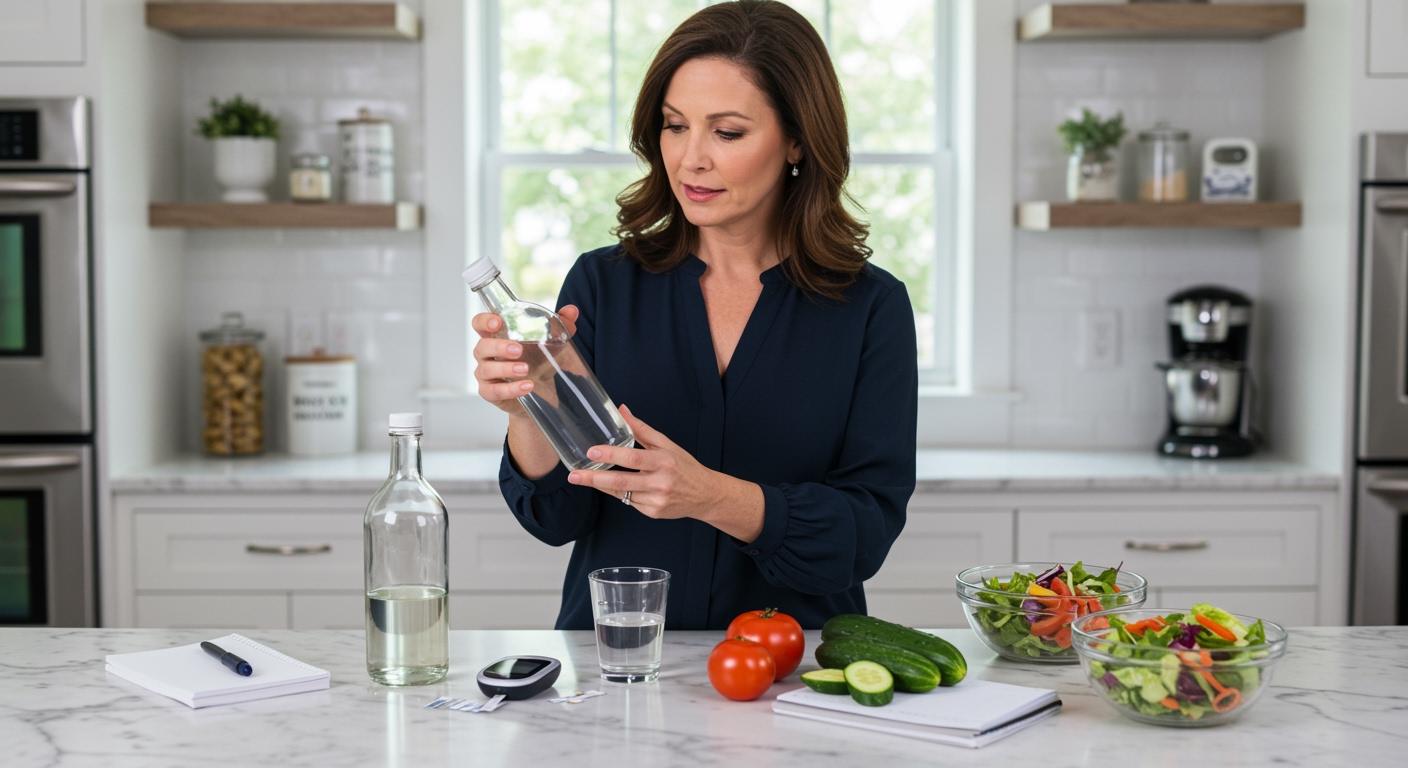✪ Key Takeaway: Yes, vinegar can help manage diabetes by improving insulin sensitivity and reducing blood sugar spikes after meals.
Introduction
Your grandmother probably used vinegar for everything from cleaning windows to preserving vegetables.
You might be wondering if this common kitchen staple could actually help manage your blood sugar levels naturally.
Hi, I’m Abdur, your nutrition coach and today I’m going to explain exactly how vinegar affects diabetes and whether it deserves a place in your daily routine.
How Does Vinegar Actually Work on Blood Sugar?
Vinegar contains acetic acid, which is the key compound responsible for its blood sugar benefits.
When you consume vinegar before or with meals, the acetic acid slows down the digestion of starches in your stomach.
This slower digestion means glucose enters your bloodstream more gradually instead of causing sharp spikes.
Research shows that vinegar also improves insulin sensitivity, helping your cells respond better to insulin signals.
The acetic acid activates an enzyme called AMPK, which plays a crucial role in glucose metabolism and energy production.
Studies have found that people with type 2 diabetes who consumed vinegar before meals experienced 20-30% lower blood sugar levels compared to those who did not.
✪ Fact: Just two tablespoons of vinegar can reduce post-meal blood sugar spikes by up to 25%.
What Type of Vinegar Works Best for Diabetes?
All vinegars contain acetic acid, but some types offer additional benefits for people with diabetes.
Apple cider vinegar gets the most attention because it contains beneficial compounds called polyphenols from the apples.
These polyphenols provide extra antioxidant protection and may offer additional metabolic benefits.
White vinegar, red wine vinegar, and balsamic vinegar all contain similar amounts of acetic acid and will provide comparable blood sugar benefits.
The key is choosing vinegar with at least 4-6% acetic acid content, which is standard for most commercial vinegars.
Avoid flavored vinegars that contain added sugars, as these can counteract the blood sugar benefits you are trying to achieve.
✪ Pro Tip: Look for raw, unfiltered apple cider vinegar with the “mother” for maximum health benefits.
When Should You Take Vinegar for Maximum Effect?
Timing matters when using vinegar to manage blood sugar levels effectively.
The most effective approach is consuming vinegar 15-30 minutes before meals, particularly those high in carbohydrates.
This timing allows the acetic acid to begin working on your digestive system before food arrives.
You can also consume vinegar during meals by using it as a salad dressing or adding it to cooking.
Some people find taking vinegar at bedtime helps reduce morning blood sugar levels, though this effect varies between individuals.
Start with one tablespoon diluted in water and gradually increase to two tablespoons if well tolerated.
Never consume vinegar undiluted as the high acidity can damage your tooth enamel and irritate your throat.
✪ Note: Always dilute vinegar in at least 8 ounces of water to protect your digestive system.
Are There Any Risks or Side Effects?
While vinegar is generally safe for most people, there are important precautions to consider.
The high acidity can cause stomach upset, nausea, or heartburn in sensitive individuals.
People taking diabetes medications should monitor their blood sugar closely, as vinegar can enhance the effects of these drugs.
This combination might lead to dangerously low blood sugar levels if not properly managed.
Vinegar can also interact with certain medications, including diuretics and insulin, potentially affecting potassium levels.
Long-term use of undiluted vinegar may damage tooth enamel and cause throat irritation.
Always consult your healthcare provider before adding vinegar to your diabetes management routine, especially if you take prescription medications.
✪ Pro Tip: Start with small amounts and gradually increase to assess your individual tolerance.
How Much Vinegar Should You Use Daily?
The optimal dosage for blood sugar management has been studied extensively in clinical trials.
Most research shows benefits with 1-2 tablespoons of vinegar per day, divided between meals.
Start with one teaspoon diluted in water and gradually work up to one tablespoon if you experience no adverse effects.
You can increase to two tablespoons daily after your body adjusts, but more is not necessarily better.
Higher amounts may increase the risk of side effects without providing additional benefits.
Consider spreading your daily intake across multiple meals rather than consuming it all at once for consistent effects.
Remember that vinegar is a supplement to, not a replacement for, proper diabetes management including medication, diet, and exercise.
✪ Fact: Clinical studies typically use 15-30ml of vinegar, which equals about 1-2 tablespoons.
The Bottom Line
Vinegar can be a valuable addition to your diabetes management toolkit when used properly and consistently.
Small changes in your kitchen can lead to significant improvements in your health, and vinegar represents one of the simplest yet most effective natural approaches to blood sugar control.
I would love to hear about your experiences with vinegar or answer any questions you might have about incorporating it into your daily routine, so please share your thoughts in the comments below.
References
At NutritionCrown, we use quality and credible sources to ensure our content is accurate and trustworthy. Below are the sources referenced in creating this article:
- Diabetes Care: Vinegar Improves Insulin Sensitivity to a High-Carbohydrate Meal
- PMC: Beneficial effects of Apple Cider Vinegar on weight management, Visceral Adiposity Index and lipid profile
- Healthline: Apple Cider Vinegar and Type 2 Diabetes
- Frontiers in Clinical Diabetes and Healthcare: The effect of apple cider vinegar on postprandial glycemia—a systematic review and meta-analysis





